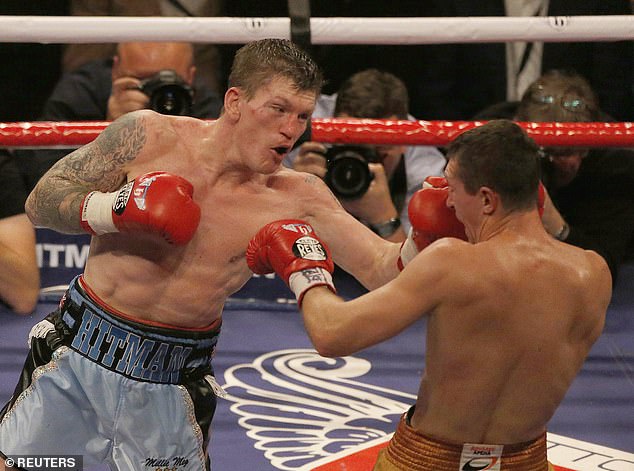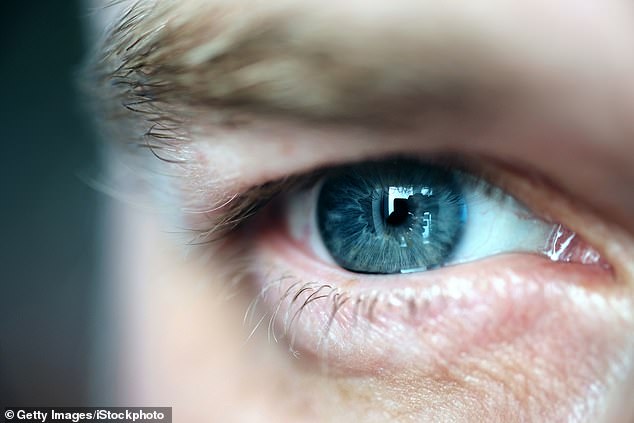Boxing champion Ricky Hatton thought his eyesight was deteriorating with age – in reality his eyeball was out of shape
As four-time world boxing champion Ricky Hatton squinted and held his phone closer to the light, all he saw was a frustrating blur.
Somewhere on the screen were key details of a major boxing deal Ricky was negotiating on behalf of his son and fellow boxer Campbell, 23.
Unable to find his glasses, he had no choice but to ask a passerby to read out the important message.
“My vision started to deteriorate when I was 40 and it has gotten worse every year since,” says Ricky, who is 45 and lives alone in Manchester.
‘It really hindered my life. One of the things I enjoy most is giving motivational speeches and after-dinner speeches.
‘But I lived in fear of standing in front of a room full of people, having to go through my notes, and then realizing I didn’t have my reading glasses with me.’
World boxing champion Ricky Hatton sees it clearly, with his girlfriend, actress Claire Sweeney
Compared to his documented problems with poor mental health and addiction to alcohol and drugs, his failing eyesight may not seem like much of a threat to a man who was known as ‘The Hitman’ during his boxing career.
But the father of three – he also has two daughters, aged 11 and 10, from his former fiancée Jennifer Dooley – insists it has at times seriously hampered him in his new role as a boxing promoter and trainer.
‘I’m constantly on the road and on my phone with work appointments,’ he says. ‘All my messages and my calendar are on my phone. That includes details of where the guys I train are boxing, my after-dinner speaking engagements and my charity work.’ (Ricky is a mental health ambassador.)
Seeing distant objects was less of a problem, but reading – especially small text on his phone – became so difficult that his friends called him Grandpa.
“I didn’t mind because I’m one myself (his son has a six-year-old daughter),” said Ricky, who retired from professional boxing in 2012. “But I was concerned that there was something seriously wrong with my eyes.”
A visit to the optician revealed that he had presbyopia (an age-related condition that makes it difficult to see close-up objects due to stiffening of the lens). He was prescribed reading glasses.
But he kept losing them, so he bought some ready-made copies and kept them scattered around the house.

Boxer Ricky Hatton in action in 2012, during an illustrious career in the ring
‘Yet I could never find them when the phone rang and I had to take notes,’ he says. ‘And the cheap ones I got off the shelf at the local chemist weren’t brilliant – it was all a bit of a blur.’
Desperate for a solution, Ricky consulted a private eye clinic, Optegra, in Manchester in February. Tests revealed that in addition to presbyopia, he also had hyperopia, a condition where he has difficulty focusing on objects close to him. However, this is not related to ageing.
The condition, which affects around 13 million Britons, is caused by the eye being shorter than normal (front to back), which disrupts the way incoming light is refracted (or bent).
This, together with the presbyopia, explained why Ricky’s vision deteriorated so quickly.
“People like Ricky who are hyperopic often develop presbyopia much earlier,” says Shafiq Rehman, an ophthalmologist who treated him at the Optegra clinic. “They’re fine in their teens, 20s and 30s because the cornea (the clear part at the front of the eye that focuses light on the back of the eye to form an image) has a lot of flexibility. But that decreases with age.”
According to Mr Rehman, the effect of age-related farsightedness (presbyopia) on someone who is already farsighted (hyperopic) has a ‘double whammy’.
“If you have good vision, presbyopia usually starts in your late 40s, but with hyperopia it goes away until your early 40s,” he says.
People with hyperopia often have to squint to see clearly. They may suffer from eye strain or headaches, and the condition can be hereditary.
However, it doesn’t necessarily get worse with age. In fact, children with hyperopia can outgrow it as their eyes develop and lengthen. This causes the cornea to curve more, which allows for better sharp images.
Many people with this condition wear glasses their entire lives that correct the problem.
These can be prescription reading glasses or, for people who also have difficulty seeing objects in the distance, multifocal lenses. These lenses have one type of lens on the bottom to focus on objects close up and another type of lens on the top to focus on objects in the distance or to zoom in on objects in the distance.
Laser surgery, a popular treatment for nearsightedness (or myopia, the inability to see things in the distance), is less suitable for people who have difficulty focusing on things up close because of the shape of the eyeball.
Surgeons usually only perform it for mild cases of hyperopia. Even then, research shows, there is a high chance that vision will deteriorate again within five years in half of all patients, says Mr. Rehman.
He advised Ricky to have lens replacement surgery, where the natural lens is removed and a prescription plastic lens is inserted. It is only available on the NHS for patients with cataracts (when the lens becomes cloudy) that are so severe that their quality of life is affected.
The idea is that the artificial lens has the flexibility to focus the incoming light on the right point in the eye, thus producing a sharp image.
Before the procedure, Ricky had a few drops of anesthetic instilled in each eye.
Several small incisions were made in the cornea, after which the natural lens was broken and removed with a suction tube.
The capsule around the outside of the lens in both eyes – a bit like the skin of a grape – was left intact so that it could hold the new artificial lens in place.
After his operation (which cost almost £8,000 on both eyes) in April, Ricky rested for about half an hour before his agent Paul took him home.
“I didn’t even need him to stay the night,” he recalls.
‘I thought I would end up with plasters over my eyes, but I was able to watch football on TV and I had absolutely no discomfort, just like during the operation. My eyes were just a little blurry and watery.
‘I was warned to take time off work and not overexert myself, so my assistant coach stepped in.’
The next day, Ricky says, he could read the small text on his phone and his vision has gradually improved. “I went around the house and got all my old reading glasses and put them in a drawer in case someone else needs them, because I don’t have them anymore.”
In rare cases, Mr. Rehman says, patients who undergo lens replacement still need reading glasses.

During lens replacement surgery, several small incisions are made in the cornea, after which the natural lens is broken up and removed with a suction tube.
“Maybe if they want to read War and Peace,” he jokes—that is, big books printed in small type. “But generally their vision remains stable.”
But not all experts believe that replacing the natural lens is appropriate for conditions other than cataracts.
Professor David Garty, an eye surgeon at Moorfields Eye Hospital in London, who has performed more than 17,000 lens replacement operations on cataract patients, says he disagrees with the procedure simply to get rid of their reading glasses.
“I personally wouldn’t do it,” he says. “It’s an invasive procedure and there are risks such as infection, although they are very low.
‘Cataract surgery is the most commonly performed surgery worldwide and is extremely safe, highly advanced and highly predictable.
“But when patients undergo this surgery for presbyopia, they are operating on a normal eye. You really have to think about that.”
However, Professor Garty adds that in cases where patients need glasses for reading and distance vision (which Ricky had already been warned about due to his rapidly deteriorating vision), there may be ‘benefits’ to the eye surgery.
Ricky, who is in a relationship with actress Claire Sweeney, now says he ‘should have done it sooner’.
“Life has become so much more streamlined since I got that. What have I been doing for the past few years, messing around and worrying?”
